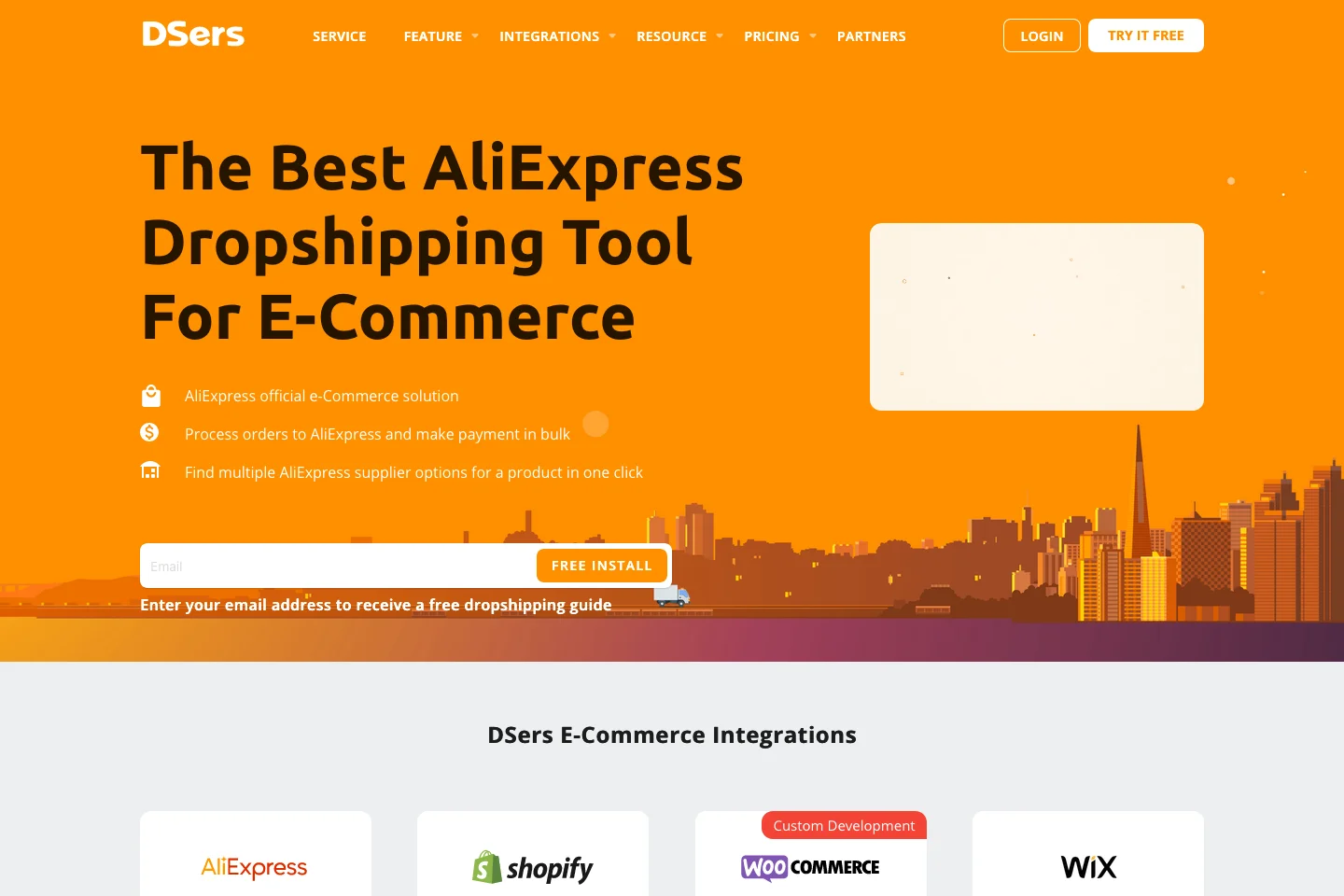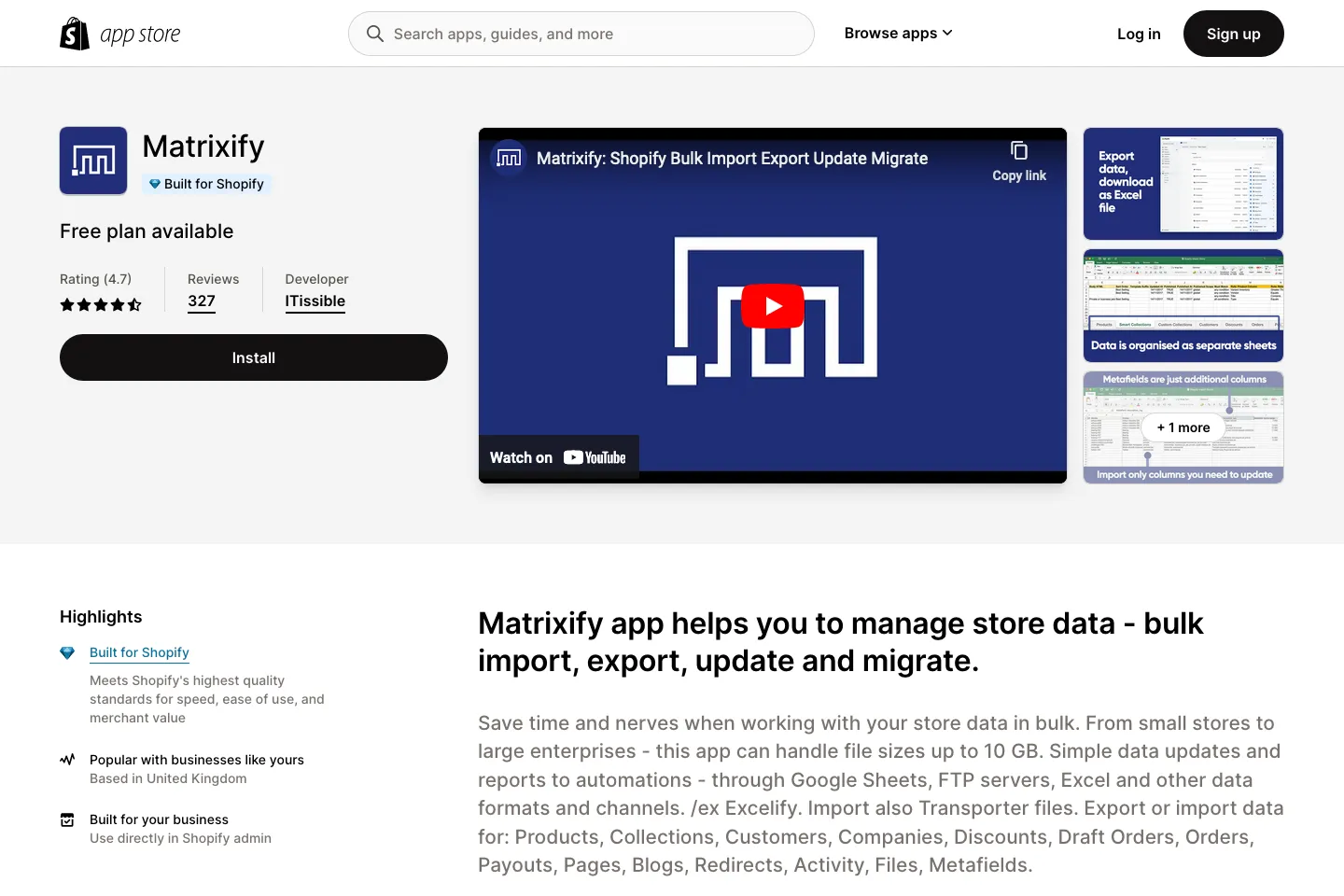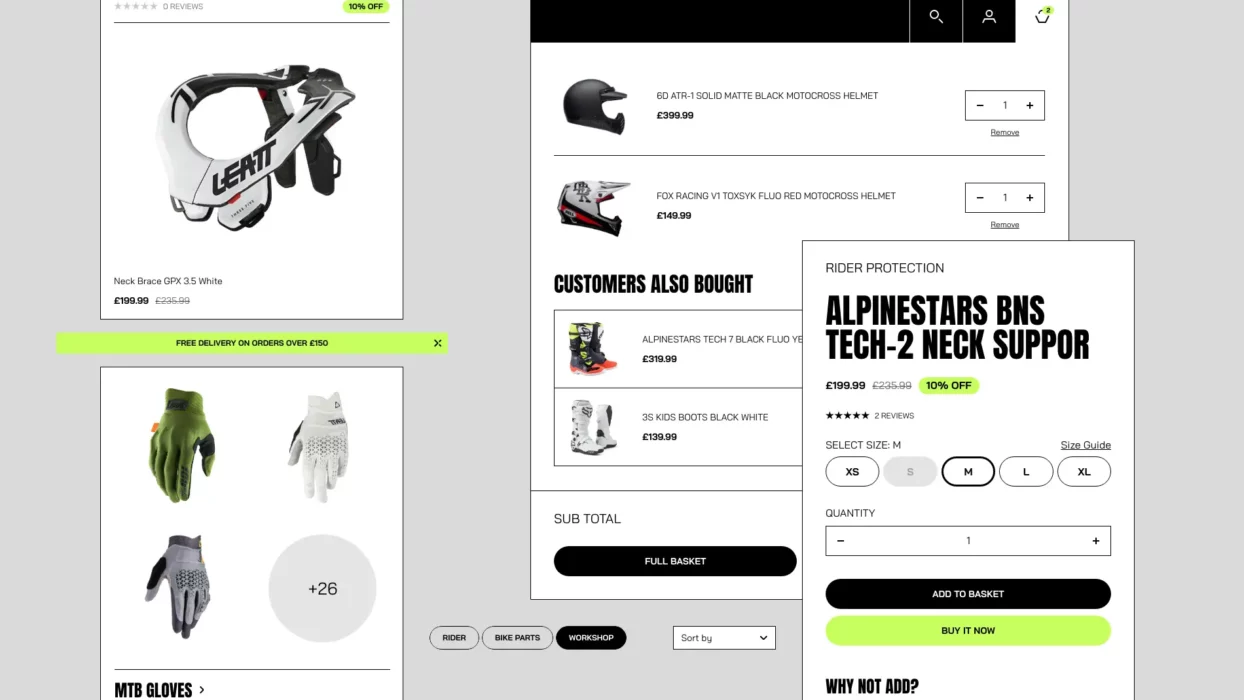Are you trying to decide between WooCommerce vs Shopify for your online store? It’s a tough decision with lots of variables to consider. WooCommerce and Shopify are popular eCommerce platforms, each offering unique features and benefits.
If you’re struggling to decide between WooCommerce vs Shopify for your online store, don’t worry; you’re not alone. With so many eCommerce options on the market, it can be difficult to figure out which platform is best for your business. As a trusted, London-based eCommerce agency, we’re often asked about the WooCommerce vs Shopify debate when businesses are looking to find the right choice for their online shop.
In this article, we’ll compare and contrast the two platforms and hopefully help you figure out which is best suited for your online store. We’ll look at the pricing, features, user experience, and more to help you make an informed decision.
This article will cover:
- What Is An eCommerce Platform?
- Differences Between WooCommerce And Shopify
- Who Uses WooCommerce and Shopify?
- How Much Control Do You Have Over Your Store’s Design?
- Payment Gateways For Each Platform
- WooCommerce vs Shopify: How Much Does Each Platform Cost?
- Managing Your Store Inventory
- WooCommerce vs Shopify: SEO Capabilities
- Customer Support
- WooCommerce vs Shopify: Shipping And Dropshipping
- Migrating to WooCommerce or Shopify
- WooCommerce vs Shopify: Which Platform Wins?
What Is An eCommerce Platform?
For the newbies, an eCommerce platform is software or technology that allows businesses to sell products or services online. It provides the tools and features to create and manage an online store, including inventory management, payment processing, and order fulfilment. With an eCommerce platform, businesses can reach a global audience and offer their products or services to customers worldwide.
eCommerce has revolutionised the way we shop and do business. In recent years, the growth of eCommerce has been exponential, with global revenue from eCommerce reaching trillions of dollars. This surge in popularity can be attributed to the convenience and accessibility of online shopping. With just a few clicks, customers can browse products, compare prices, and make purchases from the comfort of their own homes.
Data from Statista shows that in the United States alone, eCommerce sales are projected to grow to $894 billion by 2025.
Source: Statistca
Sadly, it has also seen the demise of our high streets and shopping malls. Shoppers want convenience and expect things to be on demand. Thankfully, many popular brands that have closed their physical stores have successfully transitioned to online using eCommerce platforms as a vital tool for keeping their businesses alive, maintaining an online presence and tapping into the growing world of online shopping. eCommerce stores are a convenient and reliable solution for businesses of all sizes, allowing them to continue managing a successful store beyond the high street and reach new markets.
Differences Between WooCommerce And Shopify
When setting up an online store, one of the first decisions you’ll need to make is which eCommerce platform to use. Two popular options are Shopify and WooCommerce.
When choosing an eCommerce platform for your online store, it’s important to consider the differences between WooCommerce and Shopify. One key distinction is the hosting aspect. Shopify is a fully hosted platform, meaning that it takes care of all the technical aspects of your store, including hosting. With Shopify, you don’t have to worry about server management or dealing with any technical issues. This makes it an excellent option for those who don’t have much technical expertise or want to have everything in one ecosystem.

On the other hand, WooCommerce is a plugin for WordPress, meaning you’ll need your own hosting and domain. This gives you more control and flexibility over your store; you’re not tied into a platform that can dictate the rules. With WooCommerce, you can choose your a WordPress hosting provider and have complete control over your server. This is especially beneficial if you have specific hosting requirements or want more control over your website’s performance and security.
Another difference between Shopify and WooCommerce is the level of customisation they offer. Shopify provides a wide range of pre-designed templates and themes, making it easy for beginners to set up a visually appealing store. However, these customisation options can be limited compared to WooCommerce, which offers greater flexibility and customisation. With WooCommerce, you can customise every aspect of your online store, from the design to the functionality.
| Shopify | WooCommerce |
|---|---|
| Offers three pricing plans starting at £25 per month | Free, although you will need to purchase hosting |
| Comes with a free myshopify.com subdomain for all plans, you can add one you have bought | It doesn’t include a free domain; you will need to buy your own |
| Supports an unlimited number of products, but variations are limited | Supports an unlimited number of products and variations |
| Specific transaction fees for all your payments | Transaction fees depend on which payment gateways you use |
| Shopify has an app store – both free and paid-for apps | Has an extension store (similar to WordPress plugins), which come as both free and paid for |
| 24/7 support | WooCommerce offers support through a help desk as well as extensive documentation |
| Includes an SSL certificate as part of every plan | Includes SSL support – an SSL certificate needs to be purchased |
| Features its own analytics system but can be integrated with Google Analytics | Can be integrated with Google Analytics using a plugin |
We are an experienced multidisciplinary eCommerce agency and boast a team comfortable with both Shopify web design and WooCommerce website design, so while there are accessible off-the-shelf themes for both platforms, we always recommend a custom theme when creating an eCommerce store on either platform. You’ll get something unique for your brand and the expertise to help you navigate launching a website.
Ultimately, the choice between Shopify and WooCommerce depends on your needs and preferences. If you’re looking for a fully hosted platform that offers simplicity and ease of use, Shopify might be your choice. However, if you want more control over your store’s hosting and customisation options, WooCommerce might be the better fit.
Who Uses WooCommerce and Shopify?
Shopify hosts a vast array of more than 1 million vendors. We’ve used Shopify to help merchants sell a diverse range of items ranging from personalised made-to-measure curtains to craft beer and sporting goods. It serves as the foundation for small-scale businesses looking to establish themselves online, take a product to market and for international brands such as Gymshark, who have seen exponential growth since adopting it as their platform of choice.

A formidable competitor to Shopify, WooCommerce has gained significant traction in its adoption rate. The total number of live websites with the WooCommerce plugin installed globally is 6.3 million. However, if we look at historical data, Built With reports 13.6 million sites. As a plugin for WordPress it’s no surprise, considering that WordPress powers roughly 63% of all CMS websites and is used to power nearly 43% of all websites.
We’ve built eCommerce stores on WooCommerce for clients like Fumo Design and Xpert Workwear, giving us the flexibility to create highly customised shopping experiences.
How Much Control Do You Have Over Your Store’s Design?
WooCommerce and Shopify offer a plethora of chic themes that are sure to leave a lasting impression on your customers. With thousands of themes to choose from for each platform, revamping the appearance of your store is as easy as a few clicks.
Third-party marketplaces offer a wide range of premium WooCommerce themes, with ThemeForest boasting over 1,200 themes. In contrast, the selection of themes available for Shopify is comparatively smaller. However, all Shopify themes are designed for the platform and optimised to enhance sales. In contrast, WooCommerce themes, though stylish and sophisticated, are subject to less quality control. Therefore, a Shopify theme may be better if quality is a top priority. While WooCommerce provides a greater variety of options, Shopify’s curated selection focuses more on quality and optimisation.

But beware, why opt for a theme your nearest competitor might use once they’ve seen your website or why risk buying one that hasn’t been optimised for SEO, is bloated, and is aimed at various markets? Why not opt for a more bespoke theme? We’re a trusted WooCommere agency and a team of Shopify web design experts who’ll create you a custom theme on either platform. Get something unique for your brand.
Payment Gateways For Each Platform
Payment gateways play a crucial role in the success of your online store. These gateways are the channels through which your customers can make secure payments for their purchases. When comparing WooCommerce and Shopify, it’s essential to consider each platform’s payment gateway options.
Shopify provides its users a payment gateway that works out of the box. This means you don’t have to go through the hassle of integrating a third-party payment gateway into your store. And if you use Shopify Payments, you won’t be charged transaction fees.

Shopify also supports a wide range of popular external payment gateways. But they do charge additional fees for using these gateways. If you choose a third-party payment provider, additional fees will be 2%, 1% or 0.5% for their Basic Shopify, Shopify, and Advanced Shopify plans, respectively. Therefore, you might want to use its payment gateway if you pick Shopify.
With Shopify’s built-in options, you can start accepting payments immediately, ensuring your customers a seamless and convenient shopping experience.
WooCommerce gives you the flexibility to choose from a variety of payment gateways. Whether you prefer PayPal, Stripe, Authorize.Net, or any other provider, WooCommerce allows you to integrate your preferred gateway into your store. However, you may need the help of a WooCommerce agency to style anything that doesn’t look quite right once added to your store. This level of flexibility is great for online store owners who have specific preferences or want to take advantage of a gateway that Shopify does not natively support.
A survey conducted by Bold Commerce found that the most popular payment gateways used on WooCommerce sites are PayPal (45%), followed by Stripe (29%). On Shopify sites, Stripe is the most popular (56%), followed by PayPal (22%).
Source: Bold Commerce
It’s important to remember that specific gateways may require you to purchase a WooCommerce extension to run on your store and may take their own transaction fees. WooCommerce also has its payment gateway that incurs additional costs.
Both Shopify and WooCommerce offer solid payment gateway options. Shopify’s built-in gateways provide convenience and ease of use, while WooCommerce’s flexibility allows you to choose the gateway that best suits your needs.
WooCommerce vs Shopify: How Much Does Each Platform Cost?
Now, let’s dive into the pricing comparison between WooCommerce and Shopify. When it comes to the cost of running an online store, it’s important to consider both the upfront expenses and the ongoing fees.
Starting with Shopify, it offers several pricing plans to choose from. The basic plan starts at £25 per month, while the more advanced plans range from £65 to £344 monthly (as of August 2023). These plans include hosting, an SSL certificate, and access to Shopify’s features and tools. However, it’s worth noting that some advanced features may require additional fees or the use of third-party apps. As a trusted Shopify agency, we can take you through the options and help you to decide which plan fits best for now and in the future.

WooCommerce is a free plugin for WordPress. This means you can set up your online store without upfront costs other than engaging with a WooCommerce agency like ours to design and develop a customised store. However, you’ll still need to invest in your website hosting and domain, which can range from a few pounds per month to a few hundred per year, depending on your hosting provider and plan. Additionally, WooCommerce offers a variety of paid extensions and themes that can add extra functionality to your store.
When comparing the costs, consider the scalability of your online store. While Shopify’s monthly plans may seem more expensive initially, they include hosting and technical support. However, most worthwhile add-ons and apps cost a pretty penny. WooCommerce doesn’t have the upfront costs, but pricing can vary depending on your hosting provider and the specific extensions you choose.
The decision between WooCommerce and Shopify will depend on your budget and the specific needs of your online store. Consider the upfront costs and the ongoing fees when comparing the pricing of these two platforms.
Managing Your Store Inventory
WooCommerce and Shopify offer efficient inventory management features, including product tracking, stock alerts, report generation, and bulk product uploading through CSV files.
While both platforms help manage product inventory, there is a notable difference in their handling of product variations. Product variations refer to the attributes that can be applied to a particular product, such as size or colour. WooCommerce provides greater flexibility, allowing an unlimited number of product variations, whereas Shopify has a limit of 100 variants and three options per product. To exceed this limit on Shopify, third-party apps must be used, which adds another monthly or annual cost for running an eCommerce store on the platform.
A study by Ecommerce Platforms found that WooCommerce sites have an average conversion rate of 1.66%, while Shopify sites have an average conversion rate of 1.52%.
Source: Ecommerce Platforms
WooCommerce and Shopify are reliable eCommerce solutions, but businesses requiring extensive product variations or a bespoke set-up should consider using WooCommerce. Contact us about your future goals for an eCommerce store, and we’ll advise you on which platform you should choose.
WooCommerce vs Shopify: SEO Capabilities
When it comes to SEO capabilities, both WooCommerce and Shopify offer their own strengths and features to help your online store rank higher in search engine results.
WooCommerce, being a WordPress plugin, gives you the advantage of leveraging the powerful SEO capabilities of the WordPress platform. WordPress is known for its SEO-friendly structure and extensive plugin options. With WooCommerce, you can use popular WordPress plugins like Yoast SEO or All in One SEO to optimise your store’s content and meta tags. You also have more control over technical SEO aspects such as server settings and URL structure, allowing you to fine-tune your store’s SEO performance.
Being a fully hosted platform, Shopify takes care of many SEO aspects for you. It includes built-in SEO features such as customisable title tags, meta descriptions, and URLs, allowing you to optimise your store’s pages for search engines. Shopify also automatically generates sitemaps, making it easier for search engines to crawl and index your website. Additionally, the platform provides fast and reliable hosting, which can contribute to better website speed and performance, a crucial factor for SEO.
Despite the fact that WooCommerce offers a broader selection of plugins, the Shopify App Store has some beneficial SEO plugins, and Yoast has dipped its toes in the Shopify App market with a similar plugin for Shopify. However, you’ll have to pay a monthly subscription for this, unlike the free WordPress version and, on top of a Shopify plan.
Both WooCommerce and Shopify offer solid SEO capabilities. If you prefer a fully hosted platform with built-in SEO features, Shopify’s hosting and SEO functionalities are a great choice. However, if you value the flexibility and customisation options that come with WordPress and its extensive plugin options, WooCommerce allows you to maximise your store’s SEO potential.
Customer Support
Both WooCommerce and Shopify offer resources and assistance to help you navigate any issues or challenges with your online store.
Shopify is known for its excellent customer support. With its fully hosted platform, you can access 24/7 customer support via live chat, email, or phone. Whether you have questions about setting up your store, troubleshooting technical issues, or need assistance with a specific feature, the Shopify support team can help. Additionally, Shopify offers extensive documentation, guides, and a vibrant community forum where you can find answers to common questions and connect with other store owners.

On the other hand, with WooCommerce being a plugin for WordPress, support is typically provided by your web design agency, like ours, your WordPress hosting provider or through the WordPress community. Many hosting providers, such as WP Engine, offer dedicated support for WooCommerce users, helping you with setup, performance optimisation, and any technical issues you may encounter.
We pride ourselves in being an expert WordPress agency and WooCommerce web design agency with a team of talented developers who can support and assist your brand when you are looking to design and build a bespoke theme for your WooCommerce website.
Overall, both WooCommerce and Shopify offer solid customer support options. If you prefer the convenience of 24/7 support and direct access to a dedicated team, Shopify’s hosting capabilities make it a great choice. However, if you’re comfortable relying on your web design agency and accessing support through your hosting provider, WooCommerce provides ample resources and assistance to help you succeed with your online store.
WooCommerce vs Shopify: Shipping And Dropshipping
For those who sell physical products, Shopify and WooCommerce provide a seamless shipping experience for merchants. You’ll be able to ship products internationally, and if you choose Shopify, you’ll benefit from its integrated partnerships with major carriers such as Canada Post, FedEx, UPS, DHL, and USPS.
Both eCommerce platforms can also be utilised for dropshipping, a retail model that involves not holding any products in inventory. Instead, items are purchased from vendors and shipped directly to customers. When creating a dropshipping business, your website will resemble a typical online store.

Shopify offers dedicated applications for the most popular marketplaces, such as Aliexpress Dropshipping. At the same time, the WooCommerce community has developed numerous plugins that allow for the direct importation of products from third-party marketplaces. The AliDropship plugin, which integrates with AliExpress and enables one-click order fulfilment, is among them.
If you want to launch a dropshipping business model, WooCommerce and Shopify are excellent choices. We’ve even written The Ultimate Guide to Shopify Dropshipping to get you started. However, it’s important to remember that many of these product marketplaces have membership fees, shipping expenses, and other costs, which may reduce your already slim dropshipping profits.
Migrating to WooCommerce or Shopify
Migrating to a new eCommerce platform can be scary. Fortunately, you’re in luck. We’re experienced in Shopify migration and have helped merchants migrate to Shopify from Magento, WooCommerce, and bespoke eCommerce platforms. You may be concerned about losing data, missing orders, or negatively impacting the customer experience. Fortunately, there are tools to help ease the migration between WooCommerce and Shopify.
Matrixify is a popular migration plugin that enables you to transfer data from an existing eCommerce store on Magento, WooCommerce, BigCommerce, Lightspeed and others. It requires some initial set-up and testing of a smaller batch of products first, but this plugin can minimise the stress during the migration process.

Cart2Cart is a widely-used plugin that allows you to migrate your data from any Shopify store to WooCommerce effortlessly. During migration, the plugin conveniently stores your data on its servers, reducing the impact on your customers. All you need to do is provide the credentials of both your Shopify and WooCommerce stores, specify the data you want to transfer, and optionally perform a demo migration before committing to the entire transfer.
WooCommerce vs Shopify: Which Platform Wins?
Now that we have explored the various aspects of WooCommerce and Shopify, it’s time to decide which platform is best for your online store. Both platforms have their unique features and benefits, so it ultimately depends on your specific needs and preferences.
Shopify: If you value simplicity and convenience, Shopify’s fully hosted solution might be the right choice. With Shopify hosting, you don’t have to worry about the technical aspects of managing a store. Everything is taken care of for you, allowing you to focus on selling your products. The user-friendly interface and pre-designed templates (if you’ve taken this route) make it easy to set up and manage your store, even if you don’t have much technical expertise.
WooCommerce: On the other hand, if you prioritise flexibility and customisation, WooCommerce might be the better fit. With WooCommerce, you have complete control over your WordPress hosting and can customise every aspect of your store’s design and functionality. The wide range of free themes and custom themes, plugins, and extensions give you the tools to create a unique and personalised online shopping experience for your customers.
Ultimately, the best platform for your online store will depend on your specific requirements, budget, and technical expertise or resources. Take the time to consider all the factors we’ve discussed in this blog post, and choose the platform that aligns with your vision and goals for your online business. Whether you choose Shopify or WooCommerce, both platforms offer the features and capabilities to help your online store succeed.
Still can’t make a decision? Then book a call with one of our experts; as Shopify Partners, we’ll help you make the right choice.



